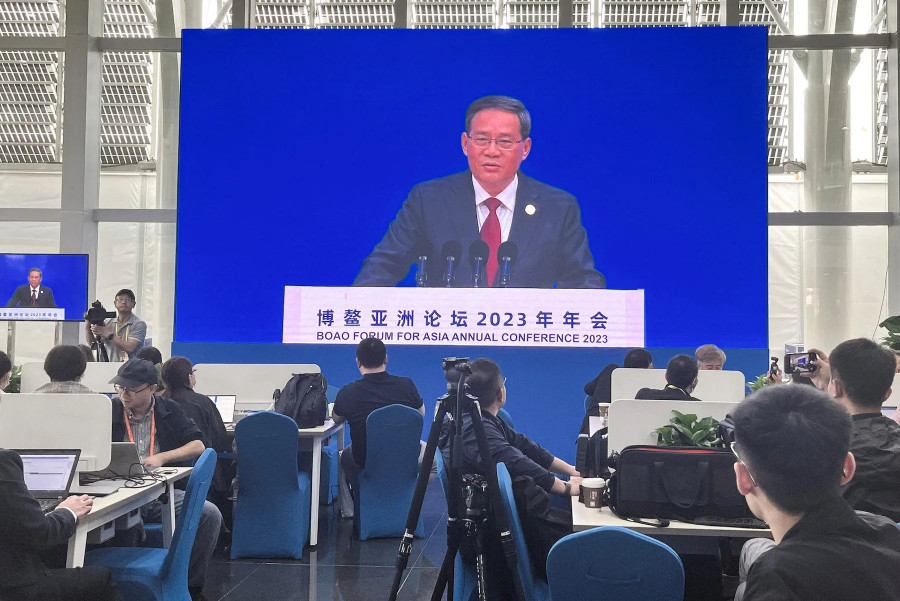National
Uncertain world order dominates Boao discourse
Experts stress Nepal should not miss chances to show up at international forums at a time of contested politics.
Purushottam Poudel
Growing tensions in international affairs took the centre stage at the annual BOAO Forum for Asia (BFA) conference in Hainan province of China. The rising confrontation between China and the United States and its potential effects on world politics took precedence at the BFA, which is otherwise designed to discuss Asia’s economic issues.
During the conference scheduled for March 28-31, topics ranging from climate change to digital economy and the future of clean energy are being discussed, as well as their possible impact on world politics.
This year’s theme of the conference—an “Uncertain World: Solidarity and Cooperation for Development amid Challenges—is significant in the context where global politics has become more erratic, said the Chinese Premier Li Qiang, while addressing the forum on Thursday.
When global politics are getting muddied, Li said: “Cooperation is most crucial. The three initiatives forged by President Xi Jinping—global development, global security, and global civilisation—are the Chinese plans to develop the world.”
“We must work together for stability and for a peaceful world. To achieve that, every country should abide by the five principles of peace mentioned in the United Nations Charter,” he added.
Li said: “We can implement the Global Security Initiative for world peace and tranquillity. Asia, home to 40 percent of the world’s population, is the anchor of the world. Asia should be the impetus for the world economy. Regional Comprehensive Economic Partnership (RCEP) and the Belt and Road Initiative’s (BRI) implementation for the successful future of Asia is imminent.”
Li also said China has been a defender of global development and peace. “In an uncertain world, the certain thing is that China is the anchor of global peace and development.”
Those speaking at the conference did not only express their concerns about a deteriorating relationship between China and the United States, they also expressed concerns about the war between Russia and Ukraine and its impact on the world economy.
Prime Minister of Singapore Lee Hsien Loong, addressing the conference, said: “The Russian invasion of Ukraine has violated the UN Charter. Asian countries should work for a good relationship with China and America.”
Addressing the conference, the managing director of the International Monetary Fund (IMF), Kristalina Georgieva, offered the suggestion of making global supply chains more beneficial for mankind.
“Globalisation has not served all, equally,” Georgieva said. “The long-term cost of trade fragmentation could cost the world economy seven percent in the coming year and the economic fragmentation will adversely impact Asia, severely,” she warned.
For the past three years, the economy of the world has been drowning, the IMF managing director said. “With the rise in interest rates, many countries’ economies are in depression. The world should soon launch a mechanism to address the issues.”
Asia's growth and development, against the background of a global economic slowdown, is a redeeming feature, said the BFA Secretary-General Li Baodong during the Global Economic Outlook session. According to him, the Asian economy is expanding gradually and China's economic recovery has sent a very clear message of stability to the world.
“Recovery of China’s economy means it will play a leading role in solving the global economic growth problems,” said the BFA Secretary-General.
The event’s speakers pointed out the dangers of the Russia-Ukraine war and the Sino-American rivalry. There was also a discussion on the impact of artificial intelligence including the viral chatbot, Chat GPT, on the world.
Nepali Ambassador to China Bishnu Pukar Shrestha represented the country at the Forum attended by around 2,000 representatives from 50 countries.
Nepal has been a regular participant at the Boao Forum for Asia since its establishment in 2001, often sending a top-level delegation to Hainan. Nepal is one of the 29 founder nations of the BFA.
Nepal did not receive an invite for the 2021 conference of the Boao Forum. This year, Prime Minister Pushpa Kamal Dahal did not attend the gathering. He had been at the event in 2017. Other Nepal officials who participated in the Forum in the past include former President Ram Baran Yadav and King Birendra. On its website, the Forum calls itself an international organisation with the founding purpose to promote economic integration in Asia.
“At a time when Nepal was in the process of Cabinet formation, it was only expected that there would be no high-level participation from Nepal at the BOAO Forum this year,” said Sundarnath Bhattarai, the director of the China Study Centre in Kathmandu.
Dahal had an official invitation for the forum, but he opted out in order to manage Nepal’s internal politics, Bhattarai added.
“However, Nepal should not miss opportunities to participate in international forums where it can voice its concerns at a time of contested global politics and turbulent economy. The country has to be heard abroad,” he said.




 10.12°C Kathmandu
10.12°C Kathmandu














